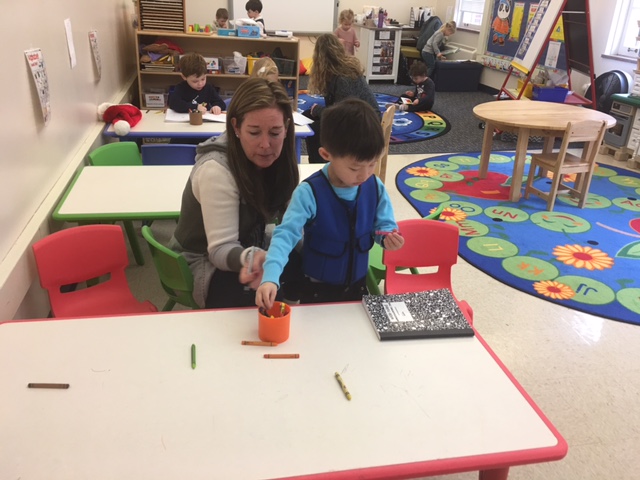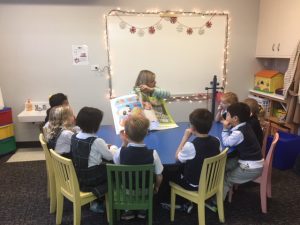The following article was contributed by Katie Carden. principal of The School of Saints Faith, Hope and Charity in Winnetka, IL.

After making his entrance into the world, my youngest son received a diagnosis of Down Syndrome. I was reassured by the great possibilities children like Ryan would have and how far society has come in terms of acceptance. I was at the same time, paralyzed by the fact that the doors to Catholic education would likely be closed to him. This thought haunted me during his early years as I watched my other children flourish in Catholic schools. Being both a parent and Catholic school principal has given me a unique perspective on inclusion in our Catholic schools.
During Ryan’s first year of life, I began to see a transformation in his siblings. Each of them, unique in their way, were beginning to share some common character traits: patience, tolerance, compassion, empathy, acceptance and a desire to advocate for the marginalized. These traits were regularly recognized by teachers, coaches and parents – and like the seeds of a dandelion, began to spread to their classmates, friends and teammates.
As I experienced inclusion as a win-win for all, I wrestled with some tough questions. Were students with disabilities being shortchanged from the opportunity to learn and grow in faith alongside their typical developing peers? Were typical developing students in our Catholic school system being shortchanged by the lack of opportunity to learn alongside the marginalized?
Loyola University (Chicago) shared my vision. I became passionate and hopeful about the possibilities after attending The Mustard Seed Conference that advocated for serving students with disabilities in Catholic school settings.
Here, like-minded educators further ignited my passion for Catholic school inclusion, and I enrolled in the first cohort of the “All are Welcome” program at LU, designed to support Catholic school principals in innovative ways to support inclusive practices.
Armed with knowledge, I set to work to open the minds of stakeholders—teachers, parents, board members and students—to the responsibility, possibilities and benefits of inclusion. And this past October, we offered a seat at our table to a student with Down Syndrome. We opened our doors to this gift from God, a beautiful little girl who just happened to have been born with an extra chromosome, into our kindergarten class. Her parents, Chris and Mary Ann Bain recently noted that after being accepted,
The weight of the world was lifted off our shoulders. Our daughter was not being marginalized. Not only was she was being welcomed, she was being celebrated.
Inclusion works in many ways. Studies show that by having the opportunity to learn alongside typically developing peers, children with special needs can realize their full potential. Additionally, typically developing peers experience a curriculum like no other as they experience first-hand the qualities of compassion, patience, tolerance, empathy and acceptance of all God’s children. In a world that is in desperate need of these qualities, why do we put these children away into special rooms when we can spread their gifts so freely? As noted by Deidre’s teacher, Mrs. Betty Ann Shanley, “The level of compassion we have seen from ALL students is mind-blowing.”
Most importantly, Catholic Social Teaching tells us that as Catholic schools, we are called to build the Kingdom of God, which includes all his children, regardless of their abilities, challenges, or physical condition. We are required to look at children with the eyes of Christ, and to love and accept the beauty of their differences. Catholic school inclusion answers the hope of Pope Benedict XVI that “no child should be denied his or her right to an education in faith, which in turn nurtures the soul of a nation.”
Pope Francis said, “Each of us has a treasure inside.” If you are willing to seek the treasure, plan to attend the NCEA 2017 New Directions Exceptional Learner Conference, June 19-21 in Chicago (Evanston, IL). Registration will open mid-March

